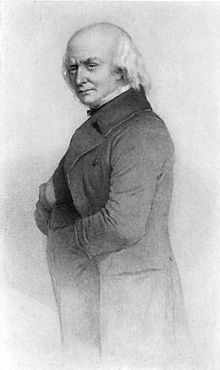Pierre-Jean de Béranger
(Redirected from Pierre-Jean de Beranger)

The parting hour is come!
And fast thy soul is fleeting
To seek its starry home.
Pierre-Jean de Béranger (19 August 1780 – 16 July 1857) was a prolific French poet and chansonnier (songwriter), who enjoyed great popularity and influence in France during his lifetime, but faded into obscurity in the decades following his death. He has been described as "the most popular French songwriter of all time" and "the first superstar of French popular music".
Quotes[edit]
- Old age doth in sharp pains abound;
We are belabored by the gout,
Our blindness is a dark profound,
Our deafness each one laughs about.
Then reason's light with falling ray
Doth but a trembling flicker cast.
Honor to age, ye children pay!
Alas! my fifty years are past!- Cinquante Ans, C. L. Betts' translation; reported in Hoyt's New Cyclopedia Of Practical Quotations (1922), p. 13.
- Ye Gods! but she is wondrous fair!
For me her constant flame appears;
The garland she hath culled, I wear
On brows bald since my thirty years.
Ye veils that deck my loved one rare,
Fall, for the crowning triumph's nigh.
Ye Gods! but she is wondrous fair!
And I, so plain a man am I!- Qu'elle est jolie, translated by C. L. Betts; reported in Hoyt's New Cyclopedia Of Practical Quotations (1922), p. 57.
- In Paris a queer little man you may see,
A little man all in gray;
Rosy and round as an apple is he,
Content with the present whate'er it may be,
While from care and from cash he is equally free,
And merry both night and day!
"Ma foi! I laugh at the world." says he,
"I laugh at the world, and the world laughs at me!"
What a gay little man in gray.- The Little Man all in Gray, translation by Amelia B. Edwards; reported in Hoyt's New Cyclopedia Of Practical Quotations (1922), p. 133.
- Nos amis, les ennemis.
- Translation: Our friends, the enemy.
- L'Opinion de ces Demoiselles, "Nos amis, nos ennemis" [Our friends, our enemies]. Expression used by the French during the truce after the capture of Sebastopol, referring to the Russians. Recorded in the London Times of that date. Reported in Hoyt's New Cyclopedia Of Practical Quotations (1922), p. 221.
- Quoique leurs chapeaux sont bien laids,
Goddam! j'aime les anglais.- Translation: In spite of their hats being very ugly, Goddam! I love the English.
- Reported in Hoyt's New Cyclopedia Of Practical Quotations (1922), p. 222.
- Adieu! 'tis love's last greeting,
The parting hour is come!
And fast thy soul is fleeting
To seek its starry home.- L'Adieu; free translation; reported in Hoyt's New Cyclopedia Of Practical Quotations (1922), p. 579.
- Ce n'est que lorsqu'il expira
Que le peuple, qui l'enterra, pleura.- Translation: And in the years he reigned; through all the country wide,
There was no cause for weeping, save when the good man died. - Le Roi Yvetot; rendering of Thackeray, King of Brentford; reported in Hoyt's New Cyclopedia Of Practical Quotations (1922), p. 683.
- Translation: And in the years he reigned; through all the country wide,
- Each year his mighty armies marched forth in gallant show,
Their enemies were targets, their bullets they were tow.- Le Roi d'Yvetot. Translation by Thackeray, The King of Brentford; reported in Hoyt's New Cyclopedia Of Practical Quotations (1922), p. 725.
- Gaily! gaily! close our ranks!
Arm! Advance!
Hope of France!
Gaily! gaily! close our ranks!
Onward! Onward! Gauls and Franks!- Les Gaulois et François, C. L. Bett's translation; reported in Hoyt's New Cyclopedia Of Practical Quotations (1922), p. 842.
He is also really
